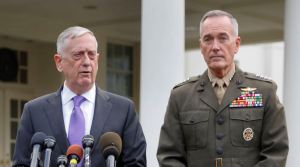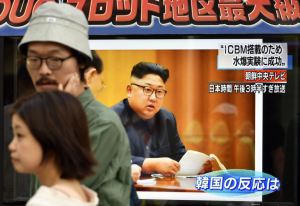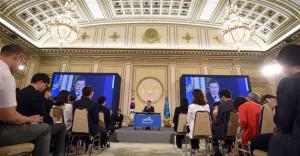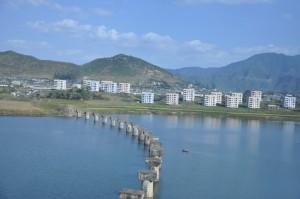Christof Lehmann (nsnbc) : North Korea conducted its sixth nuclear bomb test, described by Pyongyang’s State news agency KCNA as a miniaturized H-bomb and as a perfect success. The U.S. administration is threatening serious, including military consequences; South Korea mulls the deployment of additional U.S. troops and weapons; China and Russia call on all sides to show restraint; Few ask the question why Pyongyang would feel the need to test a nuclear device – that is, few ask the only questions that could help finding the answers that would be needed to prevent further tragedy in the Korean peninsula.
Seismic readings detected the blast on Sunday via a 6.3 magnitude earthquake. Norway’s NORSAR seismological observatory suggested the explosive yield would translate to a 120 kilotons. If correct, this would indeed be the most powerful nuclear device tested by the Democratic People’s Republic of Korea (DPRK) a.k.a. North Korea. That said, neither the estimated yield nor the seismic wave signals allow to conclusively determine the type of explosive that was used nor the physical size of a warhead.
In other words, absent conclusive evidence, one may presume that Pyongyang really has tested an H-bomb, but that it is uncertain whether it really has been miniaturized so much that it can be used to tip a missile; It could be that Pyongyang exploded a nuclear fission bomb and boasts about “the total success with a miniaturized H-bomb”.
The utility of any of the above, however, would be to strengthen the position of the ruling elite and the military among North Koreans and to play a nuclear poker game as deterrent. What nobody except very few in the DPRK (and some spook agencies who won’t tell us) really know is whether Pyongyang really has a Full House or if it is bluffing.
U.S. threatens “total annihilation” of North Korea
 U.S. Defense Secretary James Mattis, echoing the warnings of President Donald Trump, said North Korea can expect a “massive military response” if it threatens the United States, the U.S. territory of Guam or America’s allies. Ironically – and disturbingly – the United States’ rhetoric with regard to North Korea becomes increasingly as bellicose and bombastic as the propaganda spewed out by Pyongyang’s State and Party media like KCNA and Rodong Sinmun.
U.S. Defense Secretary James Mattis, echoing the warnings of President Donald Trump, said North Korea can expect a “massive military response” if it threatens the United States, the U.S. territory of Guam or America’s allies. Ironically – and disturbingly – the United States’ rhetoric with regard to North Korea becomes increasingly as bellicose and bombastic as the propaganda spewed out by Pyongyang’s State and Party media like KCNA and Rodong Sinmun.
White House officials said the president emphasized the range of retaliatory measures available to the U.S., including nuclear weapons, in a conversation earlier with Japanese Prime Minister Shinzo Abe: “President Trump reaffirmed the commitment of the United States to defending our homeland, territories, and allies using the full range of diplomatic, conventional, and nuclear capabilities at our disposal.” Mattis, Trump and the president’s top advisers met at the White House Sunday about North Korea’s announced hydrogen bomb test. The Pentagon chief came out to talk with reporters briefly afterwards to say the U.S. is not looking for the “total annihilation” of North Korea, but “we have many options to do so.”
South Korea’s flip-flopping and impotence
On Monday South Korea’s Defense Ministry chimed in stating that a nuclear-powered aircraft carrier, strategic bombers and “other powerful assets” can be deployed to the Korean Peninsula as a response to North Korea’s latest nuclear test, Seoul’s defense ministry said on Monday. “We will push for the option of deploying strategic assets such as the US carrier strike group and strategic bombers after consultation with the US,” the ministry said. The ministry also said that it was planning construction of additional facilities at the existing launch site of Terminal High Altitude Area Defense (THAAD), a US anti-ballistic missile defense system which is intended to shoot down short- and intermediate-range ballistic missiles.
What was missing was a statement from the President of the Republic of Korea (ROK) a.k.a. South Korea to distance Pyongyang from statements like “massive military response” and “totally annihilate North Korea”. South Korean President Moon Jae-In affirmed on August 17 there will be no war on the Korean peninsula. Moon stressed that Seoul effectively had a to veto over the United States’ military action in response to North Korea’s nuclear and missile programs. Moon’s assertiveness, however, doesn’t change the fact that Washington still has the wartime command over South Korea’s armed forces. The fact is, that Seoul’s command over its own military is nothing but cosmetic as long as there hasn’t been signed a peace agreement between the DPRK and the ROK. A political gimmick to make South Koreans feel better about the presence of US troops and to make South Korean politicians feel a little bit more “sovereign”. It’s a situation that causes many Germans to have “flashbacks”.
The U.S. has been South Korea’s “security guarantor” since the end of the Korean War in 1953, which left the peninsula divided and technically still in a state of conflict with no peace treaty signed. Washington has 28,500 troops stationed in the country to protect it from the North. However, Moon claimed Seoul effectively had a veto on military action by the U.S. Washington and Trump had agreed that “no matter what option they take about North Korea, all decisions will be made after consulting with and getting agreement with the Republic of Korea,” Moon said. That said, even with such an agreement that hasn’t been put down on paper and signed, it is a matter of fact that Washington could take full command over South Korea’s armed forces at any time. Washington has still the sovereign wartime command over South Korea’s armed forces. Absent a peace treaty between the DPRK and the ROK the “sovereign South Korean peacetime command” over its armed forces is hypothetical and cosmetic at best. And now look, barely one month after Moon’s assurances, his silence shows that Seoul is quite impotent when it comes to deescalating the situation in the peninsula.
Putin and Xi promise to deal “appropriately” with Pyongyang but… why nobody really wants peace in the Korean peninsula
Russian President Vladimir Putin and Chinese President Xi Jinping reportedly discussed the situation on the sidelines of the ninths BRICS summit in the southeastern Chinese city of Xiamen which is scheduled for September 3-5. China’s Xinhua State news agency reported “The two leaders agreed to stick to the goal of denuclearization on the Korean Peninsula and to maintain close communication and coordination to deal with the new situation.” Putin and Xi also called on all sides to show restraint. Ironically, both Russia and China have been going along with one round of UN sanctions against Pyongyang after the other since 2013.
The development came after Kim Jong-un, in 2013, declared that he wanted to transform the DPRK into a regional economic powerhouse. Much to Moscow’s dismay, Kim envisioned cooperation with German and Swiss rather than with Russian high-tech partners. Much to Beijing’s dismay, Kim declared that he prefers the Vietnamese model for opening the DPRK’s economy and not the Chinese one.
Kim also committed the unforgivable sin to say that China no longer could count on the DPRK as merely a provider of cheap labor and minerals like rare earth minerals. Kim stressed the need for more balanced trade relations and bilateral relations and as ridiculous as that may sound, Kim’s daring visions prompted a typically imperialist and capitalist row between the two “people’s republics”.
Kim, in his 2013 New Year speech and on numerous other occasions, made it clear that bringing North Korea’s economy on par with that of South Korea is one of the most important preconditions for a peaceful reunification. Those who have studied Korea’s post-war history will clearly see that Kim, the Communist Party, and Pyongyang’s military-industrial complex and oligarchy are more interested in their political and economic survival after a reunification than in a united Korea with a communist one-party regime. Having close ties to German advisers, Kim will also be acutely aware of the need to prevent the type of whole sale of North Korean assets that was seen during the reunification of east and west Germany. All those plans for a peaceful and dignified reunification – without absolute western capitalist hegemony – are of course mortal sins in the eyes of the oligarchies in Washington.
As unbelievable as it may sound, the DPRK may actually be the one country in the region that is most interested in a peace agreement and the “Finlandization” of the Korean peninsula. Nobody else seems to be interested in it and the propaganda that is disseminated in American, Chinese and Russian as well as in South Korean media reflects this very well. Peace is bad for business. The real risk is that gunboat diplomacy could lead to a Sarajevo-like situation where events on the ground begin to determine the decisions made by policy makers instead of policy makers determining what is supposed to happen on the ground. A conventional war in the peninsula could easily develop into an unacceptable tragedy. The fact that even a so-called minor, limited nuclear war would have global consequences for years to come and cause the death of millions should be enough to prompt everybody to protest against “any” elected official who is playing chicken with nuclear weapons. Insanity is a reason for impeachment.
CH/L – nsnbc 04.09.2017
nsnbc international is mainly financed by small monthly donations from readers like you. Please use the donate button in the right column to support our work. Readers who donate a modest monthly amount will receive email updates and receive other benefits. If you subscribe to nsnbc international, please use the same email address that you are using when you donate via PayPal. Thank you for your much-needed support.
Source Article from https://nsnbc.me/2017/09/04/north-korea-didnt-test-h-bomb-in-a-political-vacuum/
Related posts:
Views: 0
 RSS Feed
RSS Feed
















 September 4th, 2017
September 4th, 2017  Awake Goy
Awake Goy 














 Posted in
Posted in  Tags:
Tags: 
















